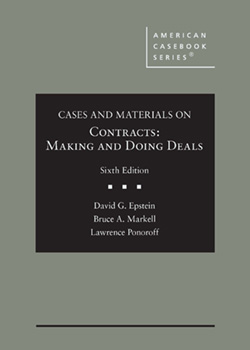- Home
- Cases and Materials on Contracts, Making and Doing Deals
Cases and Materials on Contracts, Making and Doing Deals
This title is a part of our CasebookPlus™ offering as ISBN 9781636597232. Learn more at
Faculty-CasebookPlus.com.
Making and Doing Deals is a book that your students will enjoy learning from both during the course and beyond. It is also a book that should be fun for you to teach from. It’s a book that students find entertaining (at least compared to their other law books) and, therefore, a book that they will read. Since the First Edition, students have been reading
Making and Doing Deals because the cases, problems, and text not only help them learn what they need to know as first-year law students, but also address the real-world problems and situations they will encounter long after they graduate.
Imprint: West Academic Publishing
Series: American Casebook Series
Publication Date: 04/11/2022
David G. Epstein, University of Richmond School of Law
Bruce A. Markell, Northwestern University School of Law
Lawrence Ponoroff, Tulane University School of Law
CasebookPlus™
This title is available in our CasebookPlus format. CasebookPlus provides support beyond your classroom lectures and materials by offering additional digital resources to you and your students. Anchored by faculty-authored formative self-assessments keyed to our most popular casebooks, CasebookPlus allows students to test their understanding of core concepts as they are learning them in class – on their own, outside of the classroom, with no extra work on your part. CasebookPlus combines three important elements:
- A new print or digital casebook
- Access to a downloadable eBook with the ability to highlight and add notes
- 12-month access to a digital Learning Library complete with:
- Chapter questions keyed to the casebook
- Black Letter Law questions (available in select subjects)
- Subject area review questions for end of semester use
Leading digital study aids, an outline starter, and audio lectures in select subjects
Students can still utilize CasebookPlus digital resources if they’ve purchased a used book or are renting their text by purchasing the Learning Library at westacademic.com.
With CasebookPlus, you can customize your students’ learning experience and monitor their performance. The quiz editor allows you to create your own custom quiz set, suppress specific quiz questions or quiz sets, and time-release quiz questions. Additionally, the flexible, customized reporting capability helps you evaluate your students’ understanding of the material and can also help your school demonstrate compliance with the new ABA Assessment and Learning Outcomes standards.
Among the changes from the last edition, this edition features:
- Assessment questions at the end of each chapter.
- We have expanded our treatment of electronic contracts by including a case dealing with the authenticity of electronic signatures and providing citation to external materials for those interested in learning more about the subject.
- As its importance begins to fade, we have slimmed down our treatment of the “battle of the forms” by replacing two cases with just one, but one that illustrates the basic points about the operation of § 2–207 that we think are most important to get across.
- We have also slimmed down our treatment of the doctrine of consideration, given its relative unimportance in the “real world,” although the section is probably still too long. There are some chestnut cases that we just couldn’t bring ourselves to delete.
- We have completely revised the section on the implied covenant of good faith and fair dealing, taking advantage of some of the many recent cases exploring this blossoming topic.
- We have rearranged and brought in new cases on the topics of parol evidence and conditions, as well as new revised notes on interpretation.
- We have also revised the impracticability and frustration sections by including a case discussing COVID’s effect on leases.
- We have tried to make the book more manageable by a combination of (1) eliminating some cases that did not really add a lot to what had already been covered, (2) substituting shorter cases that made the point just as well as the longer cases they replaced, and (3) more vigorously editing some existing cases.
- In addition, we are always on the lookout for cases—particularly newer cases—that will serve as better learning vehicles than the ones we have used in the past. We found several of them as well.
- We have switched out some of our remedies cases for newer, more focused ones that should lead to better discussions.
Learn more about this series.
Access Denied
Law School Faculty - Sign in or Create an Account to access this content. Law faculty who have created an account can sign in after receiving email notification that registration has been approved. Email accountmanager@westacademic.com or call 800-313-9378 for assistance.
Other Higher Education Faculty who wish to access digital review copies or teaching resources should contact their West Academic Account Manager at college@westacademic.com or 800-360-9378.
Adopters Only
This content is intended for adopters only. Sign in or Create an Account to access this content. Law faculty who have created an account can sign in after receiving email notification that registration has been approved. If you are an adopter who is unable to access this content after signing in, contact your account manager for assistance at accountmanager@westacademic.com or call 800-313-9378 for assistance.
Access Denied
Sign in or Create an Account to access this content. Faculty who have created an account can sign in after receiving email notification that registration has been approved. Contact us for assistance.
Law School Faculty: email accountmanager@westacademic.com or call 800-313-9378.
Other Higher Education Faculty: email college@westacademic.com or 800-360-9378.
Access Denied
Higher education faculty who wish to view this document should contact their West Academic Account Manager at college@westacademic.com or 800-360-9378.

